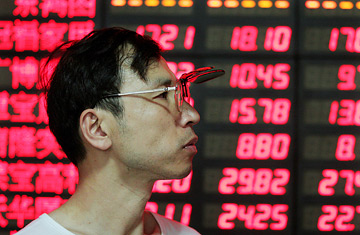
An investor looks at stock price gains at a securities company in Shanghai, China.
More than anything, the startling number testifies to the buoyancy of equity markets in China — which many analysts believe are classic, overvalued bubbles, destined at some point to crash. Indeed, the Shanghai market tumbled more than five per cent on July 5, before recovering on Friday. But $52 billion, whatever the environment, is serious money — without question a milestone in China's extraordinary economic transformation. Consider that the most money ever raised for IPOS in the United States in a single year was $63.1 billion. That was in 1999 — at the peak of the technology bubble.
That fact may be ominous — the infamous tech bubble burst the next year — and China's shares, now priced at about 45 times earnings, are definitely expensive. But there are enormous differences between Shenzhen and Shanghai now, and the NASDAQ back then. The companies offering their shares to the public in China are not small, technology oriented start ups. They are, for the most part, big state owned companies — oil and gas, mining, banks — most of which have already gone public in Hong Kong, seeking to tap the broader international capital markets. China's two main equity markets — for so called "A-shares" — remain sequestered from the outside world, available only to Chinese investors paying in Renminbi (RMB).
And those investors have been starving for places to put their money. China, economists estimate, has nearly 30 to 40 trillion in RMB savings. "People have been accumulating wealth and are desperate for good investment opportunities," says Sun. But China's banks offer paltry interest rates on deposits, so for much of the past decade, Chinese poured money into the real estate market. In part, says Sun, that's because "all the good companies in China were listing in Hong Kong," which until very recently was off limits for the vast majority of Chinese investors. The result, in the first half of this decade, was a property bubble, particularly in more prosperous eastern cities like Shanghai and Shenzhen, that drove prices out of reach of ordinary Chinese.
Economists believe the Chinese government has nudged companies that had already listed in Hong Kong to list their shares on the mainland. Officials in China knew well that their equity markets had a well-earned reputation for being poorly regulated — more casino than orderly market. That's why they introduced a new securities law a year ago, and it's also why, bankers in China say, they wanted to give retail investors a shot at investing in well known companies. "For the last year," says a western banker in Hong Kong, "the word has definitely gone out that solid, state-run companies already trading in Hong Kong should consider IPOs on the mainland." If, in the process, that diverted some savings that was otherwise serving to drive up the price apartments in Shanghai — and it definitely did — that was fine, too.
The question now: Does this year's extraordinary pace of IPOs in China signal a sea change — a year that marks financial leadership in greater China moving from Hong Kong to the mainland? That thought, when the PwC forecast came out on July 4, was definitely giving western investment banks in Hong Kong heartburn, because China still maintains strict limits on their ability to underwrite deals on mainland markets. They probably needn't worry too much, at least not yet. "Hong Kong is still an international market, and the mainland markets aren't, and won't be anytime soon," says Sun. "That's still enormously attractive to mainland (Chinese) companies." Indeed, the Shanghai-based Fosun Group, the largest privately held company in China, will try to raise more than $1 billion in an IPO in Hong Kong later this month — a deal underwritten by Morgan Stanley and UBS.
For China's regulators, the more important issue is this: Having overhauled the nation's laws regulating its stock markets and successfully enticed some of the country's blue chip companies to issue stock at home, what happens now if a crash comes? Some investors in China, in fact, are already miffed at the government, saying that the new supply of shares coming to the mainland's markets — regional banks such as the Bank of Nanjing are next in the IPO line — are starting to put downward pressure on equity prices. As far as the authorities are concerned, a bit of a correction is probably welcome. But as tech investors in the US learned in 1999, corrections have a way of becoming something worse — and $50 billion can become a lot less than that in a hurry.
